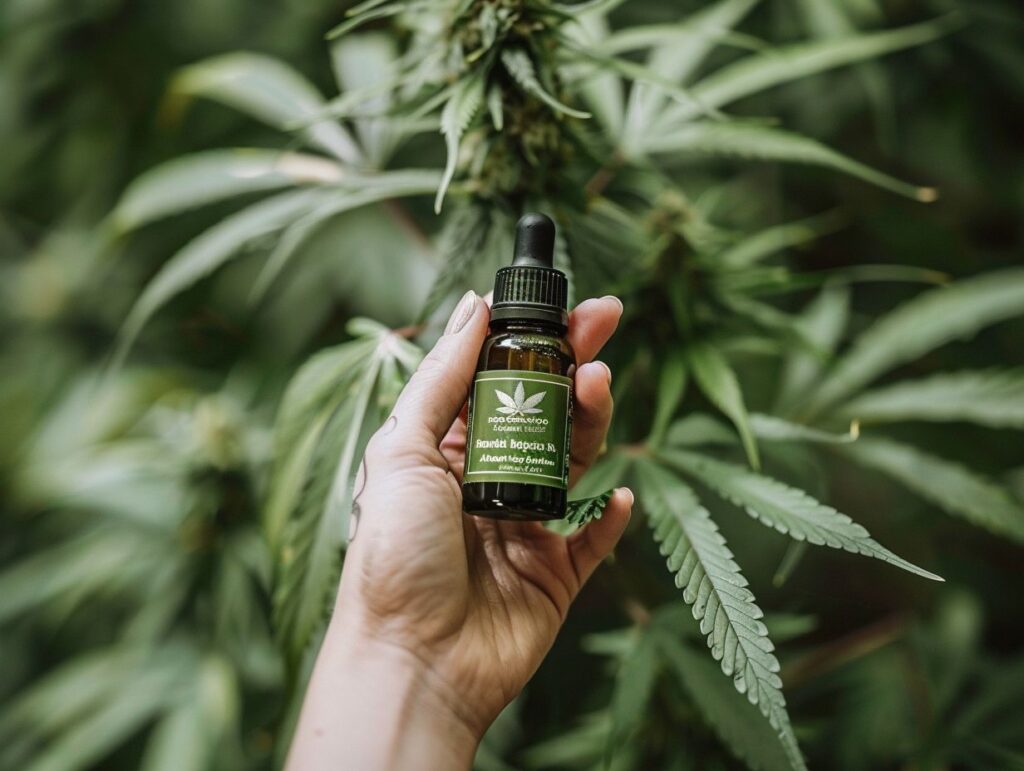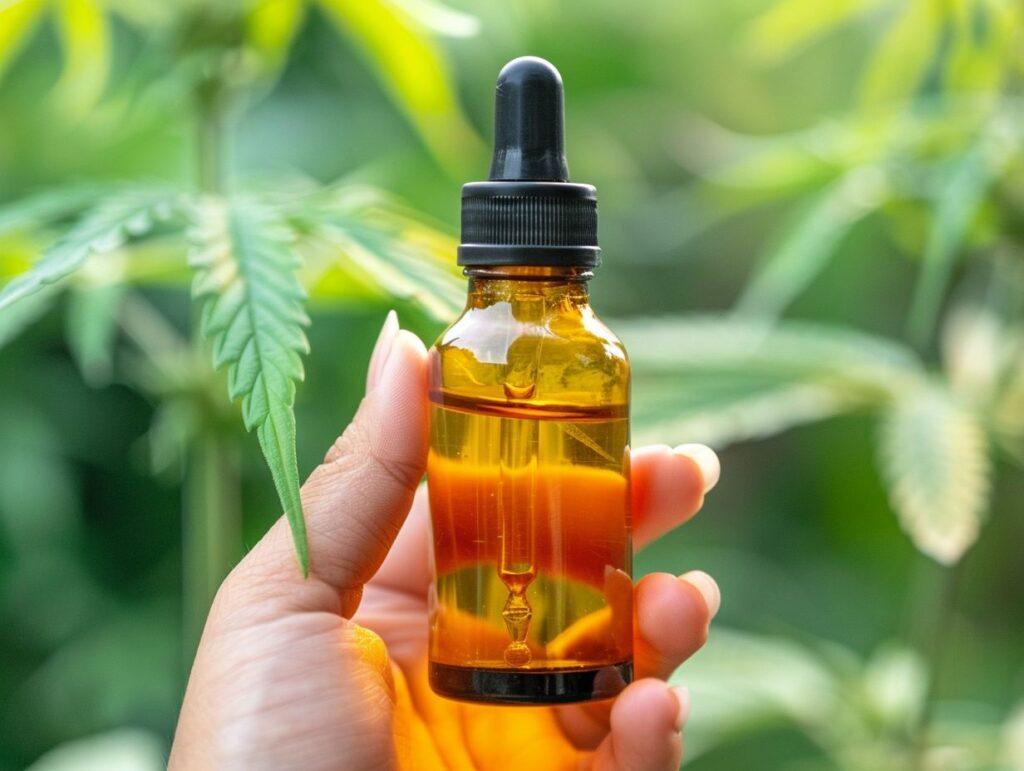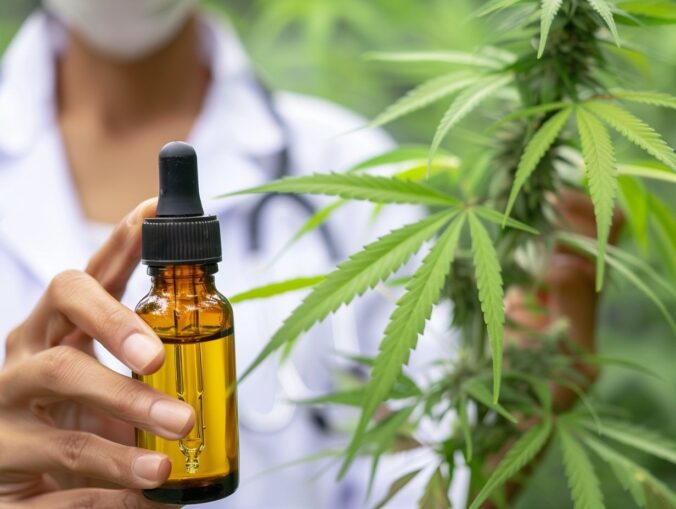Curious about CBD and its potential benefits, but concerned about potential side effects?
- We will explore what CBD is, how it works, and the various potential benefits it may offer, such as pain relief and anxiety management.
- We will also discuss the different forms of CBD available, including oil, capsules, topicals, and edibles.
- We will delve into the possible side effects and risks of using CBD, as well as how to minimize these risks.
Stay tuned to learn more!
How Does CBD Work?
CBD interacts with the body’s endocannabinoid system, which plays a crucial role in regulating various physiological processes. Through its interaction with cannabinoid compounds, CBD exhibits therapeutic effects.
This interaction occurs as CBD acts upon the endocannabinoid receptors, particularly the CB1 and CB2 receptors. By modulating these receptors, CBD helps in maintaining homeostasis within the body, which is essential for optimal functioning. This mechanism of action allows CBD to influence a wide range of physiological functions, including pain sensation, mood regulation, immune response, and inflammation.
The pharmacological aspects of CBD involve its ability to inhibit enzymes that break down endocannabinoids, thereby prolonging their effects and enhancing overall wellness. This unique role of CBD in holistic healing has garnered significant attention in recent years for its potential in addressing various health conditions.
What Are The Potential Benefits Of CBD?
CBD has been studied extensively for its potential health benefits and wellness properties. Scientific evidence suggests that CBD may offer relief in various medical conditions and promote overall well-being.
Research indicates that CBD could be effective in managing conditions such as anxiety, chronic pain, and epilepsy. CBD has shown promise in reducing inflammation, improving sleep quality, and even supporting skin health. Some studies have even suggested that CBD may help to alleviate symptoms associated with cancer treatment, such as nausea and pain. The versatility of CBD in addressing a wide range of health issues has increasingly garnered attention from both medical professionals and individuals seeking natural alternatives for better health.
Pain Relief
One of the most prominent benefits of CBD is its potential for pain relief. Studies have shown that CBD can effectively manage pain, including chronic pain conditions, through its anti-inflammatory properties.
Research has indicated that CBD interacts with the endocannabinoid system in the body, helping to regulate pain, inflammation, and other immune responses. This natural compound has been found to be especially beneficial in managing neuropathic pain, arthritis, multiple sclerosis, and even cancer-related pain. The analgesic properties of CBD not only provide relief from physical discomfort but also offer a safer alternative to traditional pain medications, as it is non-addictive and has minimal side effects.
Anxiety and Depression Management
CBD shows promise in managing anxiety and depression by regulating mood disorders and providing mental health benefits. Its anxiolytic properties have been recognized in various studies.
Research suggests that CBD interacts with serotonin receptors in the brain, which play a crucial role in mood regulation. By influencing serotonin levels, CBD may help alleviate symptoms of anxiety and depression.
A 2019 study published in the Journal of Clinical Psychology found that CBD significantly reduced anxiety levels in participants. A review published in the Neurotherapeutics journal indicated that CBD may have antidepressant effects due to its impact on the endocannabinoid system. These findings highlight the potential of CBD as a natural alternative for improving mental well-being.
Neuroprotective Properties
CBD exhibits neuroprotective properties that can benefit cognitive function and may aid in managing neurological disorders. Research suggests that CBD plays a role in supporting brain health.
Studies have shown that CBD’s ability to regulate neurotransmitter function and reduce inflammation in the brain contributes to its neuroprotective effects. By interacting with the endocannabinoid system, CBD helps in maintaining a balance within the brain and promoting overall cognitive well-being. Ongoing research indicates that CBD may have therapeutic potential in alleviating symptoms of conditions such as epilepsy, Alzheimer’s disease, and multiple sclerosis by modulating neuronal activity and protecting against neurodegeneration.
Anti-inflammatory Effects
CBD’s anti-inflammatory effects make it a valuable resource in combating inflammation and potentially managing autoimmune diseases. Research indicates that CBD can modulate the immune response.
Through its interaction with cannabinoid receptors in the body, CBD has been found to regulate immune responses, reducing pro-inflammatory cytokines and promoting anti-inflammatory effects.
In studies involving autoimmune conditions such as rheumatoid arthritis and multiple sclerosis, CBD has shown promise in alleviating symptoms by dampening the exaggerated immune response that leads to tissue damage.
The ability of CBD to balance the immune system’s activity without suppressing it entirely is crucial in maintaining a healthy inflammatory response and potentially mitigating the progression of autoimmune diseases.
What Are The Different Forms Of CBD?

CBD is available in various forms to suit different usage preferences and dosage requirements. Common forms include CBD oil, capsules, topicals, and edibles, each with specific product labeling guidelines.
CBD oil is one of the most popular forms due to its versatility – it can be taken sublingually for fast absorption or added to food and beverages. Capsules are convenient for precise dosing, while topicals offer targeted relief when applied directly to the skin. Edibles, like gummies or chocolates, provide a tasty way to incorporate CBD into your daily routine. It is crucial to follow the recommended dosages provided on the product labels to ensure safe and effective use of CBD products.
CBD Oil
CBD oil is one of the most popular forms of CBD products, typically obtained through various extraction methods. Quality control is crucial in ensuring the purity and potency of CBD oil.
- Extracting CBD oil involves careful processes to separate the desirable compounds from the cannabis plant.
- Common extraction methods include:
- Solvent extraction: uses chemicals like ethanol or butane to draw out CBD oil.
- CO2 extraction: utilizes pressurized carbon dioxide for a clean and efficient extraction.
- Ethanol extraction: involves using ethanol as a solvent to strip the cannabinoids from the plant material.
- Rigorous quality control measures, such as third-party testing for contaminants and proper storage conditions, are essential to maintain the integrity of CBD oil products.
CBD Capsules
CBD capsules offer a convenient and discreet way to consume CBD, with considerations for bioavailability. Consumer awareness regarding CBD capsule usage is essential for optimal results.
Educating consumers on the proper usage and dosage guidelines can help them make informed decisions when incorporating CBD capsules into their wellness routine. Understanding bioavailability factors, such as the absorption rate and effectiveness of CBD in capsule form, is key to experiencing the full benefits of this natural supplement. By following recommended dosage instructions and being aware of individual tolerance levels, users can achieve consistent results and maximize the potential health advantages of CBD capsules.
CBD Topicals
CBD topicals are applied externally and are commonly used for addressing skin conditions. Quality assurance measures are necessary to ensure the safety and effectiveness of CBD topicals.
When it comes to skin-related issues, CBD topicals have gained popularity due to their potential benefits. From alleviating inflammation to soothing irritated skin, these products offer a natural alternative for managing various skin conditions.
By undergoing rigorous quality assurance protocols, manufacturers can guarantee the purity and potency of CBD topicals, providing consumers with peace of mind about the products they are using on their skin. The transparency in sourcing high-quality ingredients and adhering to strict manufacturing standards plays a crucial role in ensuring the efficacy of CBD topicals.
CBD Edibles
CBD edibles provide a tasty and discreet way to consume CBD, but considerations for digestive issues and FDA regulations are important for consumer safety.
Individuals find CBD edibles appealing as they offer a convenient and enjoyable method of incorporating the benefits of CBD into their daily routine.
The process of digestion plays a crucial role in how effectively the CBD is absorbed by the body when consuming edibles.
The FDA sets specific guidelines and standards that manufacturers must adhere to in order to ensure the safety and quality of CBD edibles.
It is vital for consumers to look for clear and accurate labeling on products, detailing the CBD content and ingredients used, to make informed choices and prioritize their well-being.
Are There Any Side Effects Of Using CBD?
While CBD is generally well-tolerated, some users may experience side effects such as dry mouth, low blood pressure, drowsiness, and nausea. Allergic reactions are rare but possible.
It is crucial for individuals using CBD products to be aware of the potential side effects that could occur. Common symptoms like dry mouth and drowsiness can often be managed with simple remedies or adjustments in dosage. It is important to note that in rare cases, allergic reactions may manifest, leading to more severe complications. Therefore, users should closely monitor their body’s response to CBD and seek medical advice if they notice any concerning symptoms to ensure their safety and well-being.
Dry Mouth
Dry mouth is a common side effect of CBD usage and is often attributed to interactions with the endocannabinoid system. Precautions such as staying hydrated can help alleviate this symptom.
When CBD interacts with the endocannabinoid system, it can affect the saliva production, leading to dryness in the mouth. This occurs because of the way cannabinoids bind to receptors in the salivary glands, reducing the production of saliva.
While dry mouth may be bothersome, it is important to note that it is usually temporary and can be managed effectively. Ensuring adequate hydration is key in combating this side effect, as it can help promote saliva production and relieve the discomfort associated with dry mouth. In addition to drinking water, using sugar-free gum or lozenges can also stimulate saliva flow and provide relief.
Low Blood Pressure

CBD may cause a temporary drop in blood pressure, posing potential health risks for individuals with pre-existing low blood pressure conditions. Medical consultation is advised for those concerned about this effect.
This drop in blood pressure can lead to symptoms like lightheadedness, dizziness, or fainting, especially when standing up quickly. Individuals with hypertension should exercise caution when using CBD products, as the interaction between the compound and blood pressure medications could further lower blood pressure to unsafe levels.
It is crucial for individuals already diagnosed with low blood pressure to closely monitor their readings when experimenting with CBD and to seek guidance from a healthcare professional to prevent any adverse effects. Precautionary measures can help ensure a safe and effective use of CBD while managing blood pressure concerns.
Drowsiness
CBD can induce drowsiness in some users, particularly when taken in higher doses. Ensuring product safety and promoting patient safety through responsible usage are essential considerations.
It is crucial for individuals using CBD products to be aware of the potential side effect of drowsiness and practice caution, especially if operating machinery or driving. Product safety measures, such as lab testing and quality control, play a significant role in minimizing risks associated with CBD consumption.
Educating consumers about appropriate dosage and encouraging them to consult healthcare professionals for personalized guidance can further enhance patient safety. Monitoring for any adverse reactions and adjusting dosage levels accordingly can help individuals enjoy the benefits of CBD while mitigating unwanted effects.
Nausea
Nausea is a reported side effect of CBD usage, though it is less common than other symptoms. Ensuring quality control and transparency through lab reports can help mitigate this risk.
Maintaining high standards during the production and formulation of CBD products is crucial in preventing adverse reactions like nausea. By conducting thorough quality control checks and providing access to detailed lab reports, manufacturers can assure consumers of the safety and purity of their products. These reports not only reveal the CBD content and potential contaminants but also highlight any specific ingredients that could trigger nausea in sensitive individuals. Thus, customers can make informed decisions based on verifiable data, reducing the chances of experiencing unwanted effects.
What Are The Potential Risks Of Using CBD?
While CBD offers various benefits, there are potential risks associated with its usage, including interactions with other medications, unknown long-term effects, and concerns regarding product safety.
It is crucial for individuals to be aware of the potential risks linked to CBD consumption. One significant concern is the possibility of drug interactions when CBD is taken alongside certain medications, which could impact their effectiveness. The long-term effects of CBD usage are not yet fully understood, raising uncertainties about its sustained impact on health. Ensuring product safety is paramount, as there have been instances of CBD products being mislabeled or containing harmful additives. Educating consumers about these risks is essential for making informed decisions about incorporating CBD into their wellness routines.
Interactions With Other Medications
CBD may interact with certain medications, affecting their efficacy or metabolism in the body. Seeking medical advice and patient education are crucial steps to minimize risks associated with drug interactions.
These interactions can vary depending on the individual’s health conditions and the specific medications they are taking. It is essential for patients to be proactive in discussing their CBD use with healthcare providers to ensure safe and effective treatment outcomes.
Healthcare professionals can provide personalized guidance on managing potential interactions, such as adjusting medication dosages or timing. Patient education plays a key role in empowering individuals to make informed decisions about their health and treatment plans.
By understanding the risks and benefits of CBD-medication interactions, patients can advocate for their well-being and work collaboratively with their healthcare team.
Unknown Long-term Effects
The long-term effects of CBD use are still being researched, and uncertainties exist regarding prolonged consumption. Regular medical consultation and third-party testing can help monitor for any emerging issues.
Studies have shown that while CBD offers potential health benefits, the full scope of its long-term effects remains a topic of ongoing investigation. Researchers are delving into questions about how extended CBD use may impact liver function, mental health, and other physiological parameters.
Seeking guidance from healthcare professionals is crucial to ensure that any adverse effects are promptly identified and addressed. Third-party testing plays a crucial role in maintaining the quality and safety standards of CBD products, providing consumers with assurance that they are using a reliable and pure form of CBD.
Contamination And Mislabeling
Contamination and mislabeling of CBD products pose risks to consumer safety and efficacy. Ensuring quality assurance measures and verifying the chemical composition through lab reports are essential for product reliability.
With the increasing popularity of CBD products, the market has become saturated with a wide array of options, making it challenging for consumers to navigate. Without proper quality control measures, there is a higher likelihood of encountering products that may contain harmful substances or inaccurate CBD concentrations. By conducting thorough chemical composition analysis, manufacturers can ensure that their products meet the necessary purity standards and provide consumers with reliable and transparent information about what they are purchasing.
How To Minimize The Risk Of Side Effects?

To minimize the risk of side effects when using CBD, it is crucial to take necessary precautions such as starting with a low dosage, monitoring for any adverse reactions, and ensuring product safety through reputable sources.
It is recommended to consult with a healthcare professional before incorporating CBD into your routine, especially if you are on other medications or have underlying health conditions.
Keeping a log of your CBD intake and any effects experienced can also help pinpoint any issues and adjust your dosage accordingly.
Opting for CBD products that have undergone third-party testing for purity and potency can further enhance safety measures and reduce the likelihood of encountering unwanted side effects.
Frequently Asked Questions
Are there any side effects associated with using CBD?
Yes, there can be some side effects associated with using CBD. While it is generally well-tolerated, some people may experience mild side effects.
What are the most common side effects of using CBD?
The most common side effects of using CBD include fatigue, changes in appetite, and diarrhea. However, these side effects are typically mild and subside with continued use.
Are there any serious side effects that can occur from using CBD?
In rare cases, CBD may cause more serious side effects such as liver damage, low blood pressure, and interactions with certain medications. It is important to consult with a healthcare professional before using CBD if you have any underlying health conditions or take other medications.
Can CBD interact with other medications?
Yes, CBD can potentially interact with other medications. It is important to talk to your doctor or pharmacist before using CBD, especially if you take any prescription medications.
Are there any side effects associated with long-term use of CBD?
Currently, there is limited research on the long-term effects of CBD use. However, studies have shown that CBD is generally well-tolerated and safe for long-term use.
Are there any side effects associated with topical CBD products?
Topical CBD products, such as creams and lotions, are generally safe and do not cause any significant side effects. However, some people may experience skin irritation or allergic reactions to certain ingredients in the product.

